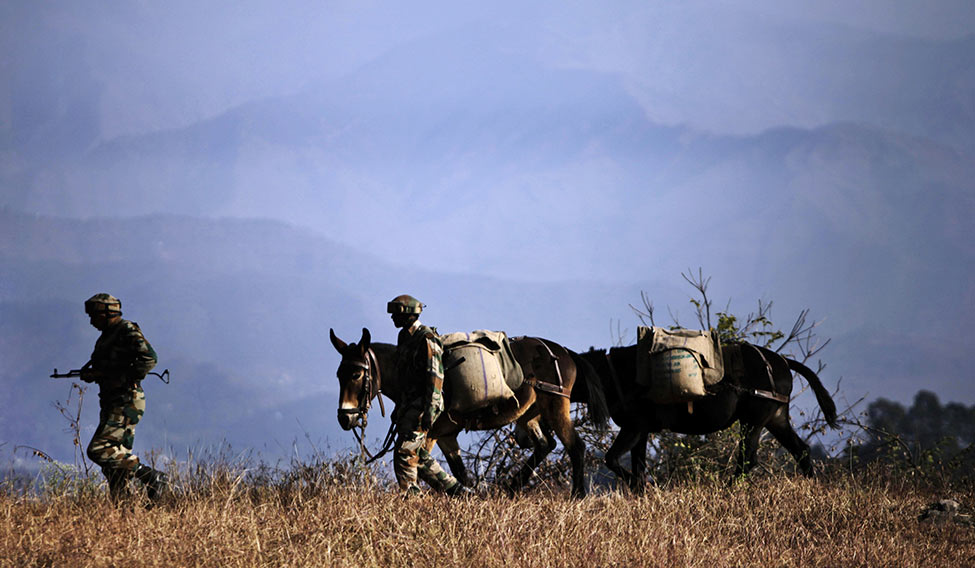On October 28 last year, the Pakistan army attacked a forward post of the Indian Army at Machil sector in Kupwara and killed rifleman Mandeep Singh of the 17th Sikh Regiment. Then, they mutilated his body.
A month earlier, the Army had carried out covert strikes in Pakistan-occupied Kashmir in response to the militant attack on the Army’s brigade headquarters at Uri in Baramulla district, in which 19 soldiers were killed and as many injured. To avenge Mandeep’s death, the Army adopted a different tactic. It identified a Pakistan army post on the Line of Control and then pounded it by putting a 155mm Bofors artillery gun in “pistol mode”. The post was decimated, and six Pakistani soldiers, including a captain, were killed. Mandeep’s killing was avenged.
On May 1 this year, Pakistan army struck again, beheading and mutilating the bodies of two Indian soldiers, Head Constable Prem Sagar of the Border Security Force and Naib Subedar Paramjit Singh of the 22nd Sikh Regiment, after ambushing a joint patrol at Krishna Ghati sector in Poonch district. The attack came a day after Pakistan army chief Qamar Bajwa visited the troops on the LoC and vowed to support “the Kashmiris’ struggle against India”.
Krishna Ghati is a vulnerable sector. The reason is that Pakistan controls more heights on the LoC in Poonch, which makes it easy for its army to target India’s forward posts in the district. In Balakote sector, for instance, Pakistan has several posts overlooking Indian positions and civilian areas.
More than a dozen Pakistan posts in the sector are manned by the Mujahideen battalion, which is suspected to have provided covering fire to the Pakistan army’s Border Action Team, which ambushed the Indian patrol at Krishna Ghati. BAT comprises personnel from the elite Special Service Group and jihadi elements.
Despite the geographical disadvantage, the Indian Army has not allowed Pakistan to dictate terms here. Poonch is guarded by one of the Army’s largest brigades comprising nine battalions. It was in this region that the Army used artillery for the first time to strike back at Pakistan, in 2015. It has not shown hesitation to intensify cross-border firing to deter Pakistan from undertaking military adventures. Also, the Army is better placed at Basoni, where several posts offer a good view into Pakistan-occupied Kashmir.
Many security experts now rue India’s decision to return Haji Pir to Pakistan. A strategically crucial mountain pass, Haji Pir was captured by the Army in the war in 1965. It was returned after India signed the Tashkent agreement the same year.
Haji Pir overlooks the vast Hijra valley in PoK and connects Poonch to Uri sector. Had India not traded Haji Pir for the territory Pakistan had captured in the war, it would have allowed the Army to link Poonch and Uri, at a distance of less than 50km. The circuitous route that now links the two places is more than 270km long. Also, the pass is used by militants to cross the LoC and travel to areas in south Kashmir.
The armies on both sides of the LoC have, for long, used ambush attacks as a tactical measure. But, the Indian Army has made such attacks public only in recent years. What prompted the latest attack by Pakistan is not clear. One reason could be the Pakistan army’s displeasure over the Nawaz Sharif government’s half-hearted action against officials who had allegedly leaked information to Dawn newspaper regarding the rift between the civilian and military leadership. The report said the government had reprimanded the army for supporting militant groups in Kashmir and Afghanistan.
Alleging that the report was aimed at maligning its image, the Pakistan army submitted a report to the government demanding action against officials who were behind the leak. Even though the government sacked Tariq Fatemi, an adviser to Sharif on foreign affairs, the army was reportedly not satisfied. The Poonch attack, say security experts, could be the army’s way of sidelining the government.
Sources, however, say it could also be a desperate attempt by the Pakistan army to avenge the losses it had suffered in the region at the hands of the BSF. Last month, the BSF had inflicted heavy casualties on a post manned by the Mujahideen battalion.






